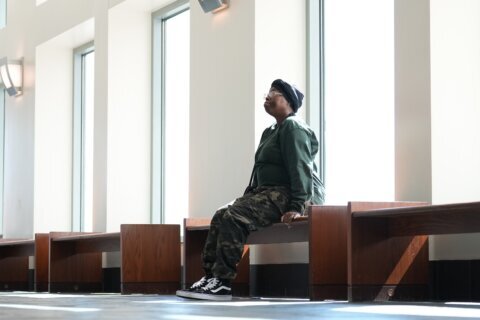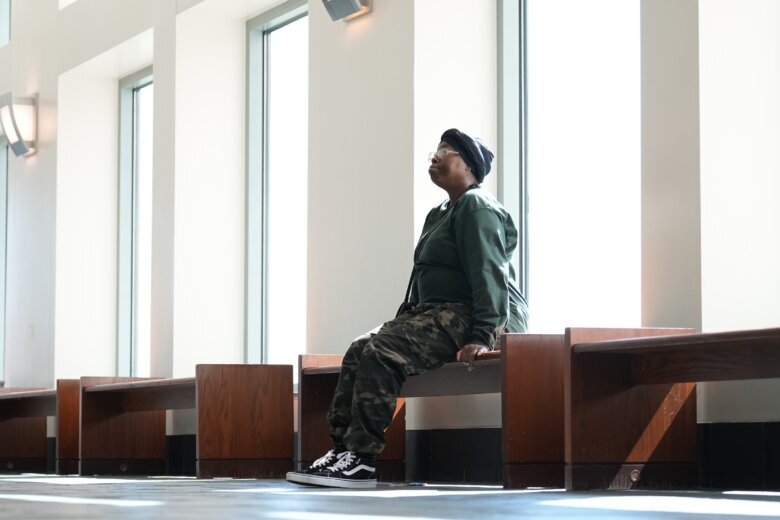
BRIGHTON, Colo. (AP) — Colorado prosecutors focused on police body camera footage — both raw and digitally enhanced — as they began building their case Thursday against two officers charged in the death of Elijah McClain, a young Black man who was stopped, put in a neck hold and sedated with ketamine four years ago.
McClain’s death, alongside the killings of George Floyd, Breonna Taylor and others, was raised up by protesters nationwide as a searing example of excessive force by police against Black people.
Charges against the officers were brought in 2021 after a revised coroner’s report determined that the powerful sedative given by paramedics to McClain, 23, played a key role in his death.
The two officers on trial, Randy Roedema and Jason Rosenblatt, have pleaded not guilty to charges of criminally negligent homicide, manslaughter and assault, all felonies. It’s the first of several cases stemming from McClain’s death, with a third officer and two paramedics scheduled for trial later this year.
David Notowitz, an expert in audio and video forensics, testified Thursday that he brightens dark video images and removes distracting sounds like sirens to help present a clearer picture of what was captured by body camera, for use in criminal trials.
The raw video from Aug. 24, 2019, has been publicly released, and includes McClain pleading with officers and telling them, “I can’t breathe.” However, the enhanced footage compiled by Notowitz, who is a paid expert for the prosecution, has not been previously shown.
Defense attorneys raised objections to some of that footage, which they described as manipulated. Judge Mark Warner said he would allow the jury to see it but issued an instruction for jurors to disregard anything seen or heard in the enhanced video if they could not see or hear it in the original.
Prosecutors introduced the original body camera video through their first witness, Lt. Delbert Tisdale, who oversees the bodycam program at the Aurora Police Department and was not present during the fatal encounter.
McClain’s mother, Sheneen McClain, sat in the front row of the courtroom for a second day Thursday.
McClain, a massage therapist, was stopped while walking home late at night in the Denver suburb of Aurora after a 911 caller reported him as suspicious, saying he was wearing a ski mask even though it was late August. Relatives say McClain wore the mask because anemia made him cold. Family and friends describe him as a gentle introvert who volunteered to play his violin for cats at an animal shelter.
His pleading words captured on body camera — “I’m just different” — painfully underscored his apparent confusion at what was happening.
If prosecutors can convince jurors the stop was unjustified, that would undermine any argument that McClain’s injuries were a result of the officers just doing their jobs.
In opening statements Wednesday, lawyers for the two sides painted contrasting pictures of the episode.
Prosecutors said the officers ignored McClain’s pleas for help and failed to follow their own training.
McClain threw up repeatedly after the neck hold and was drowning in his own vomit, prosecutor Jonathan Bunge said. “He is drifting further and further toward death. The sedative is the last thing he needs.”
Defense attorneys said the death was tragic but the officers’ actions were in line with department policies. They sought to shift blame to the paramedics.
“Mr. McClain died because paramedic (Jeremy) Cooper injected him with 1.7, 1.8 times the ketamine for someone his weight and size,” said Roedema’s attorney Reid Elkus.
McClain, who weighed 140 pounds (64 kilograms), overdosed because he received a higher dose than recommended for someone of his size, pathologist Stephen Cina found.
Cina has said he couldn’t rule out whether the stress of being held down by the officers may have contributed to his death.
Officer Nathan Woodyard, who is set to go on trial later this year, was the first to approach McClain and was soon joined by Roedema and Rosenblatt.
McClain, using earbuds, initially kept walking. Within 10 seconds, Woodyard put his hands on McClain, turning him around. As McClain tried to escape his grip, Woodyard said, “Relax, or I’m going to have to change this situation.”
The encounter quickly escalated, with officers taking him to the ground and putting him in a neck hold. McClain initially lost consciousness after one officer put him in a neck hold pressing against his carotid artery.
After McClain was kept for 15 minutes on the ground, paramedics gave him 500 milligrams of ketamine. He suffered cardiac arrest on the way to the hospital and was taken off life support three days later.
___
Brown reported from Billings, Montana.
Copyright © 2024 The Associated Press. All rights reserved. This material may not be published, broadcast, written or redistributed.








